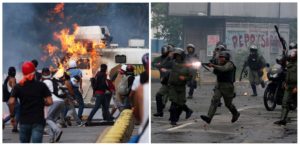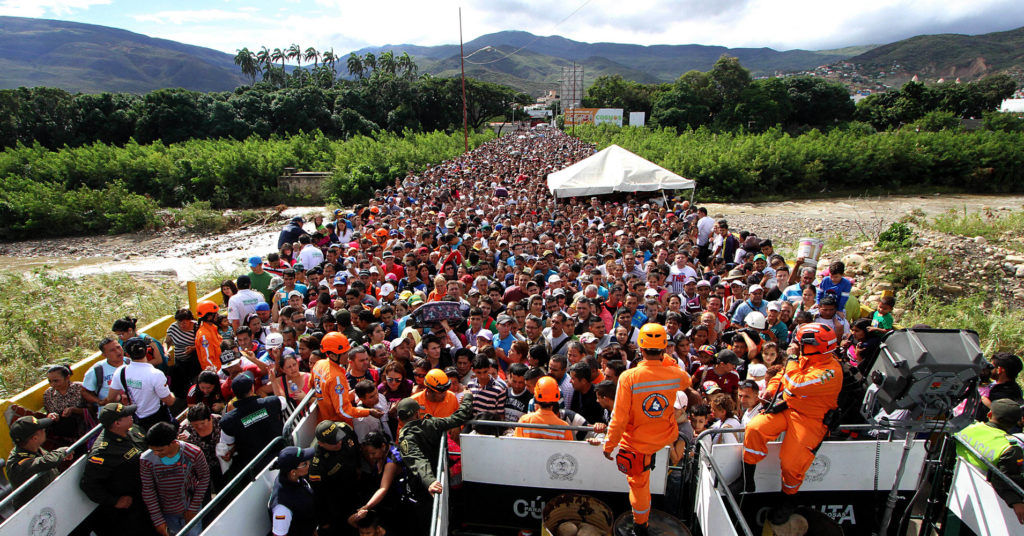The prospect of a wave of humanity crossing the border could stretch an unprepared Colombia to the brink
Just a few short weeks ago, no serious observer would have considered it likely that Venezuela could be headed toward an armed conflict, despite the country’s Zimbabwe-like slide into oblivion. But then on June 27, while addressing a crowd of supporters in Caracas, President Nicolas Maduro uttered these words: “What we failed to achieve with votes, we will do with guns.”
After that, the specter of civil war doesn’t seem so outlandish.
He was, of course, speaking about the months-long and often violent protests against his rule, (he failed to mention that his security forces were responsible for the majority of that violence), warning that if the so-called “Bolivarian revolution” was toppled, well, then the real violence would begin. That’s not to say that the violence seen thus far in the four months of street protests are by any means small potatoes. The police crackdowns, mob lynching, colectivo shootings and general chaos have killed 120 people and counting. Hundreds have been injured, and hundreds more have been rounded up and jailed.
What is Happening in Venezuela?
The Venezuelan military, the backbone of Maduro’s government, is starting to show the kind of cracks that mirror the ones spreading across the wider society around it. On Sunday, August 6, a rag-tag band of about 20 rebel soldiers raided the Paramacay military base near the city of Valencia, in Carabobo state, following a video they posted on social media. In it, they called on their brothers in arms to “disavow the murderous tyranny of Nicolas Maduro” and to “disobey the orders given by the corrupt generals.”
They went on to say their aim was not to overthrow the government, but rather an “uprising to defend the constitutional order.” The Venezuelan Constitution’s days seem numbered now, and if the new Constituent Assembly has its way, will be rewritten to consolidate the power of Maduro and his cronies, and give the veneer of legality for repressing dissent.
The rebel attack on the army base was put down in a matter of hours, but about 10 fighters fled after seizing a number of weapons, and remain at large. Two were killed in the fighting, and the remainder who were captured will most likely face treason charges. President Maduro commended the military’s quick reaction to putting down what he characterized as a “right-wing terrorist attack.”
Since the skirmish, several other videos have emerged of people dressed in military uniforms calling on the country’s armed forces to rebel against the government, with some even threatening high-ranking officials personally, including the new head of the rubber-stamp Constituent Assembly, Delcy Rodriguez; and the PSUV Party leader and former president of the now-defunct parliament, Diosdado Cabello.
In this video, posted to social media on August 7, a black-clad masked soldier threatens Maduro government officials with a 50-caliber sniper rifle. “We’re coming for you, tonight,” he says.
There is a precedent for how events are unfolding in Venezuela. Consider the following: Increasingly lethal repression of street protests, the characterization of those who oppose the authoritarian government as “fascists” and “terrorists,” growing desertion and fragmentation within the military, a growing number of soldiers taking up arms against the government, and finally, a bloody and protracted conflict with no end in sight.
Any idea where else in the world this has happened? Full points if you guessed Syria (which is somewhat ironic, given that Syria is a Venezuelan ally). True, Venezuela is not Syria, and the histories and geopolitical realities of both countries greatly differ, but Maduro seems intent on going down the path forged by Bashar Al-Assad, meaning that the conditions will be right for civil war.
Venezuela’s Chaos is Colombia’s Problem
What happens to its neighbor to the east is sure to have significant and long-lasting consequences for Colombia. Think of the ramifications should hundreds of thousands, perhaps millions, of Venezuelans stream across the border fleeing unemployment, starvation, Tiananmen Square-like repression and bloody conflict. By some accounts, this could be disastrous for Colombia, and could even threaten to undo the gains seen in the still-fragile peace process between the government and the FARC guerrillas.
But in dealing with the mass migration of humanity, Colombian President Juan Manuel Santos seems content to take a wait-and-see approach, rather than steps toward any concrete preemptive action. If the Colombian government doesn’t recognize reality and start preparing for the worst soon, then the country could be caught off guard by the sudden wave of refugees. Colombia could be just weeks or months away from managing a full-blown humanitarian crisis that is massive in scale and unprecedented in the region.

Left: An armored vehicle is set alight by protesters in Caracas on May 4 this year. Right: Police open fire on demonstrators rallying against Venezuela’s President Nicolas Maduro in Caracas last month.
In many ways, the exodus from Venezuela has been going on for years. For the most part, the countries taking in Venezuelans were able to absorb them without much of a problem. Up until recently, those who had the ability to leave were the middle and upper classes, who took with them job skills and university degrees, many of them proficient in English and other foreign languages. Plenty of well-off Venezuelans were able to buy property, find gainful employment and assimilate into their new homes in Colombia, the United States or Spain (the top three destinations for Venezuelans, in that order).
Now, it is mainly impoverished Venezuelans who are fleeing their failing country, crossing into neighboring countries on foot, pulling wheeled luggage in one hand, with a small child or two in tow with the other. Some analysts believe that as many as 10 percent of Venezuela’s 31 million people have fled, and estimates of how many of those who are living in Colombia vary wildly: as low as 300,000 to as high as a million or more. Such estimates are complicated by the fact that tens of thousands of those people are dual Venezuelan-Colombian citizens, and also because foot traffic at border crossings is free-flowing both ways, and has been for years. But now, it appears the stream is headed largely in only one direction.
So far, the most visible measures that Colombian authorities have taken is to keep tabs on Venezuelans who are attempting to immigrate here legally. For those making the effort, Colombia’s Migration office is offering Venezuelans what are called Special Permanent Permits (which go by the Spanish acronym PEP), which, if granted, means that that lucky Venezuelan can stay in Colombia indefinitely. Venezuelans already in Colombia on legitimate visas can visit the Migration website to renew or extend their current visas.
But tens of thousands aren’t doing that. Released just this week, the most recent figures from Migration state that more than 150,000 Venezuelans are staying in the country illegally, while another 50,000 have been granted residency this year. The illegal Venezuelans entered Colombia legally on a three-month tourist visa have overstayed, and have since failed to renew it or return.
To be fair, the Colombian government should at least be credited for seeking international help on how to deal with an emerging refugee crisis. In May this year, a Colombian delegation was sent to study Syrian refugee camps in Turkey to learn how to respond to a sudden wave of refugees. Does that mean Colombia has plans to build refugee camps not unlike the ones found in the nations that border Syria? And if not, how does it plan to absorb and care for hundreds of thousands of desperate and vulnerable newcomers? We’ll tackle this soon – watch this space.
Visit MiKo next week for Part 2 of our coverage of the Venezuelan migrant crisis.

Journalist. Misfit. Malcontent. Provocateur. Is a better Colombia is possible? We’re starting to have doubts.


“At least Colombia has a strong economy, a stable political system, and ample infrastructure.”
??? Literally none of those things are true. The peso has been just about the worst-performing currency in the world the last two years and the economy is still a magical-realism-based pipe dream of oil prices that will never return. The political system is only “stable” insofar as there are two parties which take turns running the country and stuffing their pockets/bank accounts while they are in power. Colombia leads the world in murdered activists, and the war is still very much going on. As for infrastructure, there are still guerilla groups regularly destroying it for their own nefarious ends in the poorest regions of the country.
Venezuelans running to Colombia is like jumping into a pit of quicksand because your house is on fire.
The President of Colombia takes a wait and see approach to a refugee wave of millions of people. At least Colombia has a strong economy, a stable political system, and ample infrastructure to absorb their poor neighbors